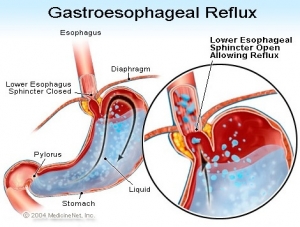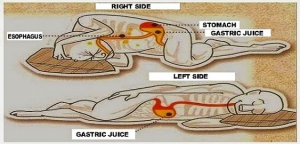‘Tis the season of over indulgence!
Perhaps you’ve been over-doing it a bit this festive season and are feeling the effects of heartburn reflux or Oesphageal Reflux Disease (GERD).
Any degree of reflux and heartburn is not only annoying but can be quite painful and debilitating.
The main trigger for heartburn and reflux is an over-full or distended stomach, and that my be why you are feeling it more than usual, perhaps a bit too much Christmas indulgence?
Reflux is not caused by excess stomach acid!
Reflux is not caused by excess stomach acid as is common belief. Drug companies are happy to perpetuate this myth as acid-reflux drugs including proton pump inhibitors (PPIs) like Nexium or Prilosec, and H2 Antoagonists like Zantac are big business. They are only meant for short term symptomatic relief, but many people end up on them long term, and often report that they don’t work that great anyway.
Long-term use can potentially have some serious consequences, and even short-term use has some undesirable side-effects.
Extended use can lead to any number of nutritional deficiencies and consequences. For example calcium deficiency leads to poor bone density and risk of fracture, while poor iron or vitamin B12 absorption cause anemia and The risk of contracting infections goes up such as pneumonia, food born infection (bacterial, parasitic) and Clostridium Difficile infection. C diff is very serious as it is now resistant to even the most powerful antibiotics.
Lowering stomach acid even for just a short while has issues as well. A lack of stomach acid means that you can’t digest your food properly. This can give rise to leaky gut, altered gut flora and the resultant food allegies and intolernaces.
There is a strong link between food allergy and allergic rhinitis (hay fever), as well as Chronic Rhinosinusitis (CRS), suffered by thousands of Australians. That annoying post nasal drip that won’t go away is a sure sign. And did you know that 10-50% of asthma cases are also triggered by food allergy?
So what does cause reflux if it’s not excess stomach acid?
 Reflux is not caused by excess acid. It is caused by a malfunction of the lower esophageal sphincter (LES) valve separating the esophagus from the stomach. Stomach contents can flow back into the esophagus causing pain and discomfort. Poor motility of the oesphagus motility then means that the reflux is not quickly expelled.
Reflux is not caused by excess acid. It is caused by a malfunction of the lower esophageal sphincter (LES) valve separating the esophagus from the stomach. Stomach contents can flow back into the esophagus causing pain and discomfort. Poor motility of the oesphagus motility then means that the reflux is not quickly expelled.
The proper treatment for GERD is not acid suppression, but avoidance of stomach distension, improvement of esophageal motility and tightening of the the LES valve.
Action Plan!
Prevention is better than cure, I always say. If you have heartburn or reflux there are simple things you can do to help –
1. Eat smaller meals
2. Relax while eating to normalise peristalsis and motility in the oesphagus so that any refluxing acid can be quickly expelled.
-Put the phone down, get of Facebook and turn off the TV. Take the time to sit and enjoy your food. Give thanks for the nourishment provided by you meal, and by slowing down. .
3. Avoid fatty and fried foods as these take longer to digest causing food to sit in the stomach longer
4. Avoid eating fruit and protein at the same time
– The best food combination for quick stomach emptying is protein and vegetables
5. Don’t lie down within 2 hours of eating, including any afternoon naps after a big lunch!
– You need to give the stomach a chance to empty. Lie on your left side so your stomach doesn’t end up upside down!
6. Take 150mg of calcium citrate powder in water after meals and before bed.*
7. It may help to drink alkaline water
8. Most importantly: identify your food allergies!
– Akaline water and calcium both sooth the oesphagus and upper stomach without suppressing stomach acid. Win-win!
Calcium is suggested, not because it buffers acid, but because it is needed by the cells that line the oesphagus to regulate motility, and it is needed to close the LES valve, thereby cutting off back flow of stomach juices into the throat. The calcium must be in solution to work, hence the use of powder mixed with water. Calcium citrate is the best form and you might need to get this from a health practitioner, as it may not be availableover the counter.
The whole body connection
While you are there you might like to have a chat about the connection between reflux, IBS, sinus problems, hay fever, chest pain, weight gain etc. Everything in the body is connected. Antacid medications might releive your heartburn symptoms if you are lucky, but they are doing nothing about the cause, and might even be making other conditions worse.
According to Dr Leo Galland, author of “The allergy solution”, there is a strong link between reflux, sinus problems, allergies and even weight gain. You might never have considered that food allergy could be causing your sinus congestion and post nasal drip, exacerbating your asthma, or causing insidious weight gain, but it is not only possible it is very likely!
Food sensitivity can come from a number of sources, and can happen anytime. You may be suddenly sensitive to a food now that never used to be a problem. It can happen due to stress, infection, antibiotic use, poor diet or toxin (pollution or chemical) exposure.
A relatively new disorder is Eosinophilic Esophagitis (EoE). This is a fancy name for inflammation of the esophagus caused by eosinophils. Eosinophils are a type of white blood cell that is activated by the immune system in response to allergens, including food allergens. Eosinophils cause inflammation of tissue (in this case in the oesophagus). They also play a major role in the permanent lung damage that occurs with chronic asthma.
EoE causes chest pain and difficulty swallowing. To heal from EoE you need to identify the food sensitivities or toxic exposures (pollutants, allegens) that are causing the painful inflammation, by either testing, or following a carefully considered food elimination diet and challenge.
A word of warning – Don’t stop acid suppressing drugs suddenly!
If you do wish to get off your reflux drugs do so in consultation with your doctor or health practitioner who can help you come off gradually. Stopping all of a sudden can cause a painful condition called “Acid rebound”.
When stomach acid production is turned off by drugs your stomach responds by increasing the number of acid-producing cells. Then when you stop the drug, all these extra cells are going to pump out excess stomach acid, then you really will have true hyper-acidity! It is far better and well advised to taper off the drug slowly, giving your body a a chance to adjust.
Don’t suffer anymore!
Heartburn and reflux are portrayed as minor medical conditions, but if you are a sufferer they are anything but! For true relief from symptoms and resolution of this annoying and inconvenient problem have a look at your diet.
I hope you found this info both interesting and timely! Please feel free to share or comment below.






